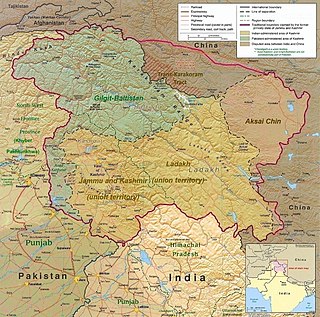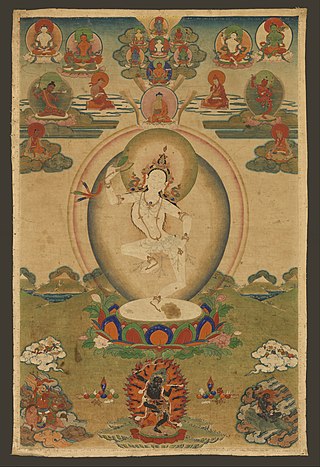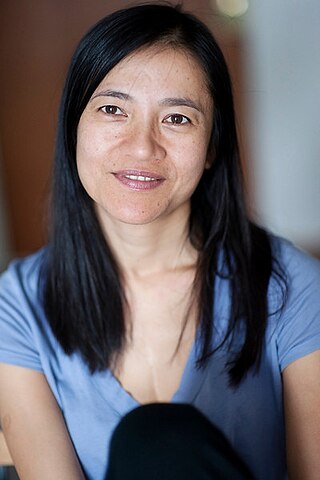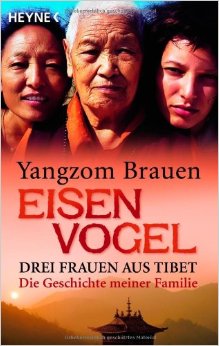Related Research Articles

Dalai Lama is a title given by the Tibetan people to the foremost spiritual leader of the Gelug or "Red Hat" school of Tibetan Buddhism, the newest and most dominant of the four major schools of Tibetan Buddhism. The 14th and incumbent Dalai Lama is Tenzin Gyatso, who lives in exile as a refugee in India. The Dalai Lama is also considered to be the successor in a line of tulkus who are believed to be incarnations of Avalokiteśvara, the Bodhisattva of Compassion.

Baltistan also known as Baltiyul or Little Tibet, is a mountainous region in the Pakistani-administered territory of Gilgit–Baltistan. It is located near the Karakoram and borders Gilgit to the west, China's Xinjiang to the north, Indian-administered Ladakh to the southeast, and the Indian-administered Kashmir Valley to the southwest. The average altitude of the region is over 3,350 metres (10,990 ft). Baltistan is largely administered under the Baltistan Division.
The flag of Tibet, also known as the "Snow Lion flag", depicts a white snow-covered mountain, a yellow sun with red and blue rays emanating from it, two Tibetan snow lions, a multi-coloured jewel representing Buddhist values, a taijitu and a yellow border around three of its four sides. The flag was used as the national flag of the independent country of Tibet from 1916 until 1951, when Tibet was annexed by the People's Republic of China. It was adopted by the 13th Dalai Lama in 1916 and used in Tibet until the Tibetan uprising of 1959, after which the flag was outlawed in the People's Republic of China. While the Tibetan flag is illegal in Tibet today as it is governed by the PRC as the Tibet Autonomous Region, it continues to be used by the Central Tibetan Administration, the Tibetan government-in-exile based in Dharamshala in India, and by pro-Tibet groups all over the world to show support for human rights in Tibet and Tibetan independence.

Peter Aufschnaiter was an Austrian mountaineer, agricultural scientist, geographer and cartographer. His experiences with fellow climber Heinrich Harrer during World War II were depicted in the 1997 film Seven Years in Tibet.
Miss Tibet is an annual beauty pageant held in McLeod Ganj, India. It is produced by Lobsang Wangyal Productions.

Machig Labdrön, or "Singular Mother Torch from Lab" (1055–1149), was a female Tibetan Buddhist monk believed to be a reincarnation of Yeshe Tsogyal, and the renowned 11th-century Tibetan tantric Buddhist master and yogini that originated several Tibetan lineages of the Vajrayana practice of Chöd.

Kyirong or Gyirong County, also known by its Chinese name Jilong, is a county of the Shigatse Prefecture, Tibet Autonomous Region, China. It is famous for its mild climatically conditions and its abundant vegetation which is unusual for the Tibetan plateau. The capital lies at Zongga (Gungthang). Its name in Tibetan, Dzongka, means "mud walls".

The Tibetan Institute of Performing Arts (TIPA) was founded by Tenzin Gyatso, the 14th Dalai Lama on reaching McLeod Ganj, Himachal Pradesh, India in exile from Tibet in August 1959. It was then called Tibetan Music, Dance and Drama Society, which was one of the first institutes set up by the Dalai Lama, and was established to preserve Tibetan artistic heritage, especially opera, dance, and music.
Amy Heller is a Tibetologist and art historian.

Tsering Wangmo Dhompa is the first Tibetan female poet to be published in English. She was raised in India and Nepal. Tsering received her BA from Lady Shri Ram College, University of Delhi. She pursued her MA from University of Massachusetts and her MFA in creative writing from San Francisco State University. She has a Ph.D. in literature from the University of California, Santa Cruz and is currently an assistant professor in the English Department at Villanova University. Her first book of poems, Rules of the House, published by Apogee Press in 2002, was a finalist for the Asian American Literary Awards in 2003. Other publications include, most recently a chapbook Revolute ,My Rice Tastes Like the Lake, In the Absent Everyday, and two chapbooks: In Writing the Names and Recurring Gestures. In Letter For Love she delivered her first short story. In 2013, Penguin India published Tsering's first full-length book, A Home in Tibet, in which she chronicles her successive journeys to Tibet and provides ethnographic details of ordinary Tibetans inside Tibet.
Tsering Dolma Gyaltong was a Tibetan spiritual leader living in exile in Toronto, Ontario, Canada. Tsering was a Founding Member of the Tibetan Women's Association and participated in its re-establishment in 1984.

Tibetans in Switzerland are people of Tibetan origin or descent living in Switzerland. Tibetans have lived in Switzerland since the 1960s, when the Swiss Red Cross helped resettle 300 Tibetans in Switzerland. In addition, approximately 150 Tibetan orphans were adopted by Swiss families.
Martin Brauen is a cultural anthropologist from Bern, Switzerland who specialises in Tibet, the Himalayas and history of religions.

Who Killed Johnny is a Swiss-American screwball comedy film by Yangzom Brauen, filmed and produced in Los Angeles in 2013.

Eisenvogel is a Swiss book published by the Swiss-Tibetan writer, film director, and actress Yangzom Brauen. The full title of the biography is "Eisenvogel: Drei Frauen aus Tibet – Die Geschichte meiner Familie", which literally means Iron bird: Three women from Tibet – The history of my family. First published in 2009, the illustrated book is also distributed as in paperback, eBook, and audiobook forms in German. Brauen later became known for directing Who Killed Johnny.

Sonam Dolma Brauen is a Tibetan-Swiss contemporary painter and sculptor.

Escape from Tibet is a 2012 Swiss-German-Tibetan Drama film.
Blanche Christine Olschak was an Austrian journalist and writer, Tibetan specialist and wrote the first comprehensive encyclopedia of women in the world.

The Tibet women's football team is a national association football team controlled by the Tibet Women's Soccer (TWS), an organization of exiled Tibetans. Its current team manager is Gompo Dorjee.
Katy Derbyshire is a British-born, Berlin-based translator and writer. Among the authors she has translated are: Clemens Meyer, Christa Wolf, Inka Parei, Helene Hegemann, Simon Urban, Rusalka Reh, Yangzom Brauen, Tilman Rammstedt, Francis Nenik, and Dorothee Elmiger. Her translation of Bricks and Mortar by Clemens Meyer was long-listed for the 2017 Man Booker Prize and won the 2018 Straelener Prize for Translation. Derbyshire has also served on the jury of Germany's Internationaler Literaturpreis and the International Dublin Literary Award.
References
- ↑ "Grossmutter betet für mich" ['Grandmother uses to pray for me']. Schweizer Illustrierte (in German). 10 September 2009. Retrieved 12 April 2015.
- ↑ Nussbaumer, Hannes (12 April 2015). "In Bern geboren, in Hollywood zu Hause, für Tibet im Einsatz". Tages-Anzeiger (in German). Archived from the original on 17 February 2012. Retrieved 11 December 2008.
- ↑ Weigelt, Nadia (27 March 2008). "Auf dem Weg nach Hollywood: Tibet-Aktivistin Yangzom Brauen" (in German). n-tv. Archived from the original on 1 April 2008. Retrieved 12 April 2015.
- ↑ Wilton, Jennifer (30 March 2008). "Ihr Kampf für ein freies Tibet". Die Welt (in German). Retrieved 11 December 2008.
- ↑ di Giovanni, Janine (7 March 2011). "Across Many Mountains: Escape from Tibet". The Daily Telegraph . London. Retrieved 13 November 2011.